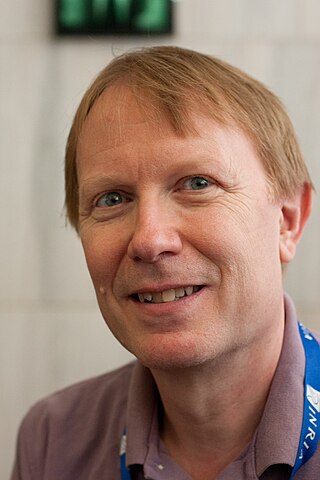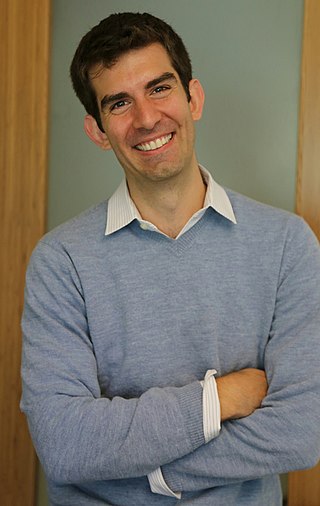
Theoretical computer science (TCS) is a subset of general computer science and mathematics that focuses on mathematical aspects of computer science such as the theory of computation, lambda calculus, and type theory.

Madhu Sudan is an Indian-American computer scientist. He has been a Gordon McKay Professor of Computer Science at the Harvard John A. Paulson School of Engineering and Applied Sciences since 2015.

Jack Joseph Dongarra is an American computer scientist and mathematician. He is the American University Distinguished Professor of Computer Science in the Electrical Engineering and Computer Science Department at the University of Tennessee. He holds the position of a Distinguished Research Staff member in the Computer Science and Mathematics Division at Oak Ridge National Laboratory, Turing Fellowship in the School of Mathematics at the University of Manchester, and is an adjunct professor and teacher in the Computer Science Department at Rice University. He served as a faculty fellow at the Texas A&M University Institute for Advanced Study (2014–2018). Dongarra is the founding director of the Innovative Computing Laboratory at the University of Tennessee. He was the recipient of the Turing Award in 2021.

Charles Eric Leiserson is a computer scientist, specializing in the theory of parallel computing and distributed computing, and particularly practical applications thereof. As part of this effort, he developed the Cilk multithreaded language. He invented the fat-tree interconnection network, a hardware-universal interconnection network used in many supercomputers, including the Connection Machine CM5, for which he was network architect. He helped pioneer the development of VLSI theory, including the retiming method of digital optimization with James B. Saxe and systolic arrays with H. T. Kung. He conceived of the notion of cache-oblivious algorithms, which are algorithms that have no tuning parameters for cache size or cache-line length, but nevertheless use cache near-optimally. He developed the Cilk language for multithreaded programming, which uses a provably good work-stealing algorithm for scheduling. Leiserson coauthored the standard algorithms textbook Introduction to Algorithms together with Thomas H. Cormen, Ronald L. Rivest, and Clifford Stein.
Vladimir Iosifovich Levenshtein was a Russian and Soviet scientist who did research in information theory, error-correcting codes, and combinatorial design. Among other contributions, he is known for the Levenshtein distance and a Levenshtein algorithm, which he developed in 1965.

Michael Fredric Sipser is an American theoretical computer scientist who has made early contributions to computational complexity theory. He is a professor of applied mathematics and was the Dean of Science at the Massachusetts Institute of Technology.
Richard Blahut, former chair of the Electrical and Computer Engineering Department at the University of Illinois at Urbana–Champaign, is best known for his work in information theory. He received his PhD Electrical Engineering from Cornell University in 1972.

Michael George Luby is a mathematician and computer scientist, CEO of BitRipple, Senior Research Scientist at the International Computer Science Institute (ICSI), former VP Technology at Qualcomm, co-founder and former Chief Technology Officer of Digital Fountain. In coding theory he is known for leading the invention of the Tornado codes and the LT codes. In cryptography he is known for his contributions showing that any one-way function can be used as the basis for private cryptography, and for his analysis, in collaboration with Charles Rackoff, of the Feistel cipher construction. His distributed algorithm to find a maximal independent set in a computer network has also been influential.
In coding theory, list decoding is an alternative to unique decoding of error-correcting codes for large error rates. The notion was proposed by Elias in the 1950s. The main idea behind list decoding is that the decoding algorithm instead of outputting a single possible message outputs a list of possibilities one of which is correct. This allows for handling a greater number of errors than that allowed by unique decoding.

Gary Lee Miller is a professor of Computer Science at Carnegie Mellon University, Pittsburgh, United States. In 2003 he won the ACM Paris Kanellakis Award for the Miller–Rabin primality test. He was made an ACM Fellow in 2002 and won the Knuth Prize in 2013.
Daniel Alan Spielman has been a professor of applied mathematics and computer science at Yale University since 2006. As of 2018, he is the Sterling Professor of Computer Science at Yale. He is also the Co-Director of the Yale Institute for Network Science, since its founding, and chair of the newly established Department of Statistics and Data Science.

Joseph S. B. Mitchell is an American computer scientist and mathematician. He is Distinguished Professor and Department Chair of Applied Mathematics and Statistics and Research Professor of Computer Science at Stony Brook University.
Michael David Mitzenmacher is an American computer scientist working in algorithms. He is Professor of Computer Science at the Harvard John A. Paulson School of Engineering and Applied Sciences and was area dean of computer science July 2010 to June 2013. He also runs My Biased Coin, a blog about theoretical computer science.

James Weldon Demmel Jr. is an American mathematician and computer scientist, the Dr. Richard Carl Dehmel Distinguished Professor of Mathematics and Computer Science at the University of California, Berkeley.
Santosh Vempala is a prominent computer scientist. He is a Distinguished Professor of Computer Science at the Georgia Institute of Technology. His main work has been in the area of Theoretical Computer Science.

Alan Stuart Edelman is an American mathematician and computer scientist. He is a professor of applied mathematics at the Massachusetts Institute of Technology (MIT) and a Principal Investigator at the MIT Computer Science and Artificial Intelligence Laboratory (CSAIL) where he leads a group in applied computing. In 2004, he founded a business called Interactive Supercomputing which was later acquired by Microsoft. Edelman is a fellow of American Mathematical Society (AMS), Society for Industrial and Applied Mathematics (SIAM), Institute of Electrical and Electronics Engineers (IEEE), and Association for Computing Machinery (ACM), for his contributions in numerical linear algebra, computational science, parallel computing, and random matrix theory. He is one of the cocreators of the technical programming language Julia.

Adam Wierman is Professor of Computer Science in the Department of Computing and Mathematical Sciences at the California Institute of Technology. He is known for his work on scheduling (computing), heavy tails, green computing, queueing theory, and algorithmic game theory.
Leonard J. Y. Schulman is professor of computer science in the Computing and Mathematical Sciences Department at the California Institute of Technology. He is known for work on algorithms, information theory, coding theory, and quantum computation.
Alexander Vardy was a Russian-born and Israeli-educated electrical engineer known for his expertise in coding theory. He held the Jack Keil Wolf Endowed Chair in Electrical Engineering at the University of California, San Diego. The Parvaresh–Vardy codes are named after him.

Tamal Krishna Dey is an Indian mathematician and computer scientist specializing in computational geometry and computational topology. He is a professor at Purdue University.












